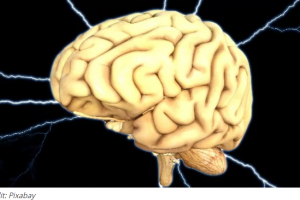Patients with multiple sclerosis had better problem solving ability and response time after training with a technology called transcranial direct current stimulation (tDCS), according to a new study published February 22, 2017 in Neuromodulation: Technology at the Neural Interface.
During tDCS a low amplitude direct current is applied through electrodes placed on the scalp using a headset. The stimulation can change cortical excitability in the brain by making it easier for neurons to fire, which can help improve connections and speed up the learning that takes place during rehabilitation.
Led by researchers at NYU Langone’s Multiple Sclerosis Comprehensive Care Center, the new study reports that participants with MS who used tDCS while playing the cognitive training computer games designed to improve information processing abilities showed significantly greater gains in cognitive measures than those who played the computer games alone. Importantly, the participants completed the cognitive training and tDCS while at home.
By enabling patients to be treated without repeat visits to the clinic, which can be a major challenge for people with MS as their disease progresses, the approach may improve quality of life for this patient population, according to the study’s authors.
Close-up of transcranial direct current stimulation (tDCS) equipment used in the study. NeuroscienceNews.com image is credited to Peter Ross for NYU Langone Medical Center.
“Our research adds evidence that tDCS, while done remotely under a supervised treatment protocol, may provide an exciting new treatment option for patients with multiple sclerosis who cannot get relief for some of their cognitive symptoms,” says lead researcher Leigh E. Charvet, PhD, associate professor of neurology and director of research at NYU Langone’s Multiple Sclerosis Comprehensive Care Center. “Many MS medications are aimed at preventing disease flares but those drugs do not help with daily symptom management, especially cognitive problems. We hope tDCS will fill this crucial gap and help improve quality of life for people with MS.”
MS is the most common progressive neurological disorder in working age adults, nearly 70 percent of whom will experience cognitive impairment with symptoms including slower information processing and difficulties with memory and problem solving. Other common symptoms of the disease include fatigue and mood, sensory and motor problems.
In this study, the brain’s dorsolateral pre-frontal cortex, an area linked to fatigue, depression and cognitive function, was targeted for tDCS.
Twenty-five participants were provided with a tDCS system with a headset they learned to apply with guided help from the research team. In each session, a study technician would contact each participant through online video conferencing, giving him or her a code to enter into a keypad that commenced the tDCS session in order to control for dosing. Then, during the stimulation, the participant played a research version of computerized cognitive training games that challenged areas of information processing and attention and working memory systems.
Members of the tDCS group participated in 10 sessions, and the researchers compared their results to 20 participants with MS who only played cognitive training games in their 10 sessions.
Researchers found participants in the group treated with tDCS showed significantly greater improvements on sensitive, computer-based measures of complex attention and increases in their response times across trials compared to the group that did cognitive training games alone. Improvements were shown to increase over time with the number of sessions, which suggests the tDCS may have a cumulative benefit. But, more research is needed to determine how long these effects may last following culmination of sessions.
The group that participated in tDCS plus cognitive training however did not show a statistically significant difference from the group that only played cognitive training games as measured by less sensitive standard neuropsychological measures like the Brief International Cognitive Assessment in MS (BICAMS) tests or on computer-based measures of basic attention. Those findings suggest the cognitive changes brought on by tDCS may require more treatment sessions to have noticeable improvements in daily functioning, according to Dr. Charvet.





Related Posts